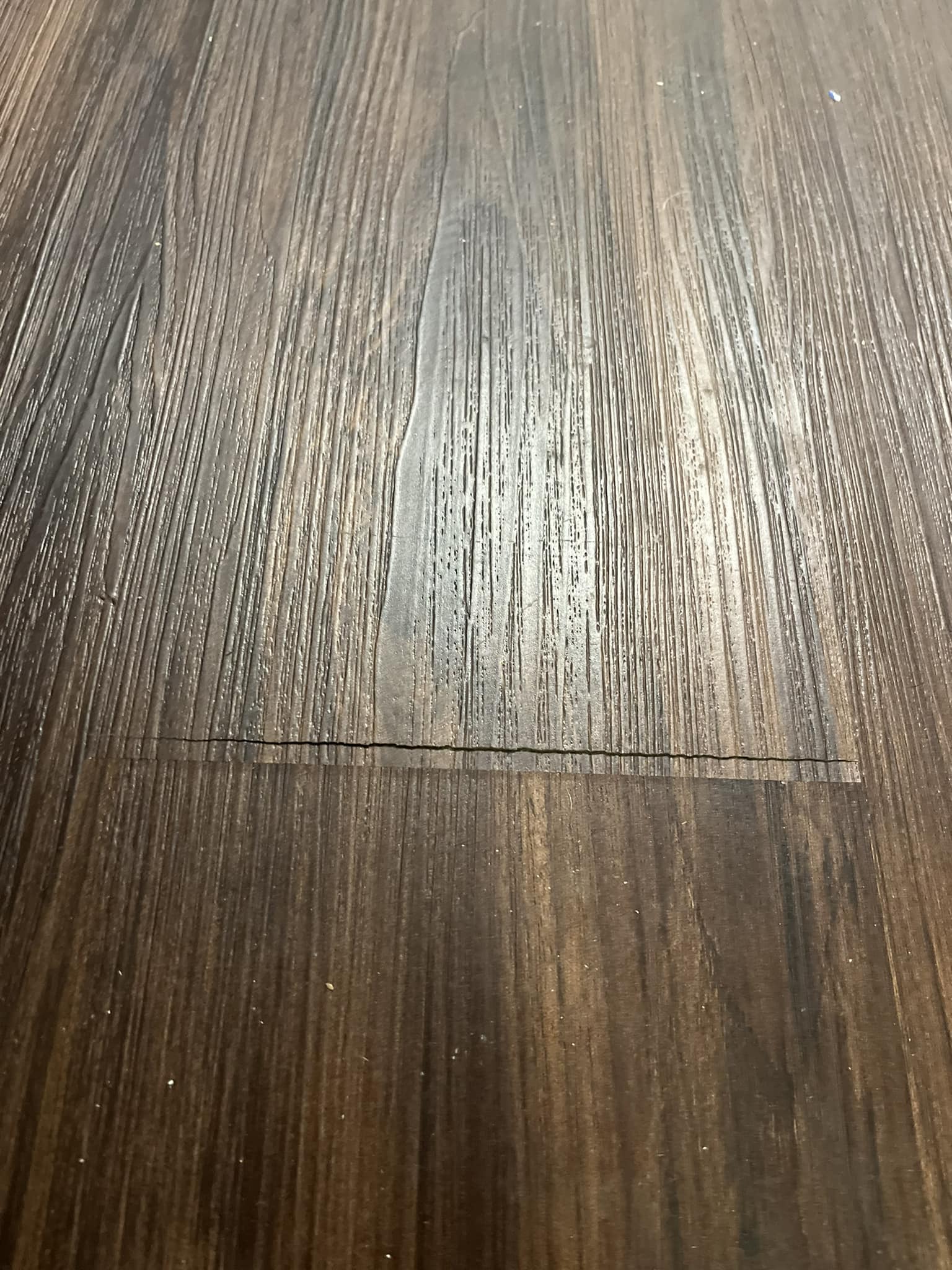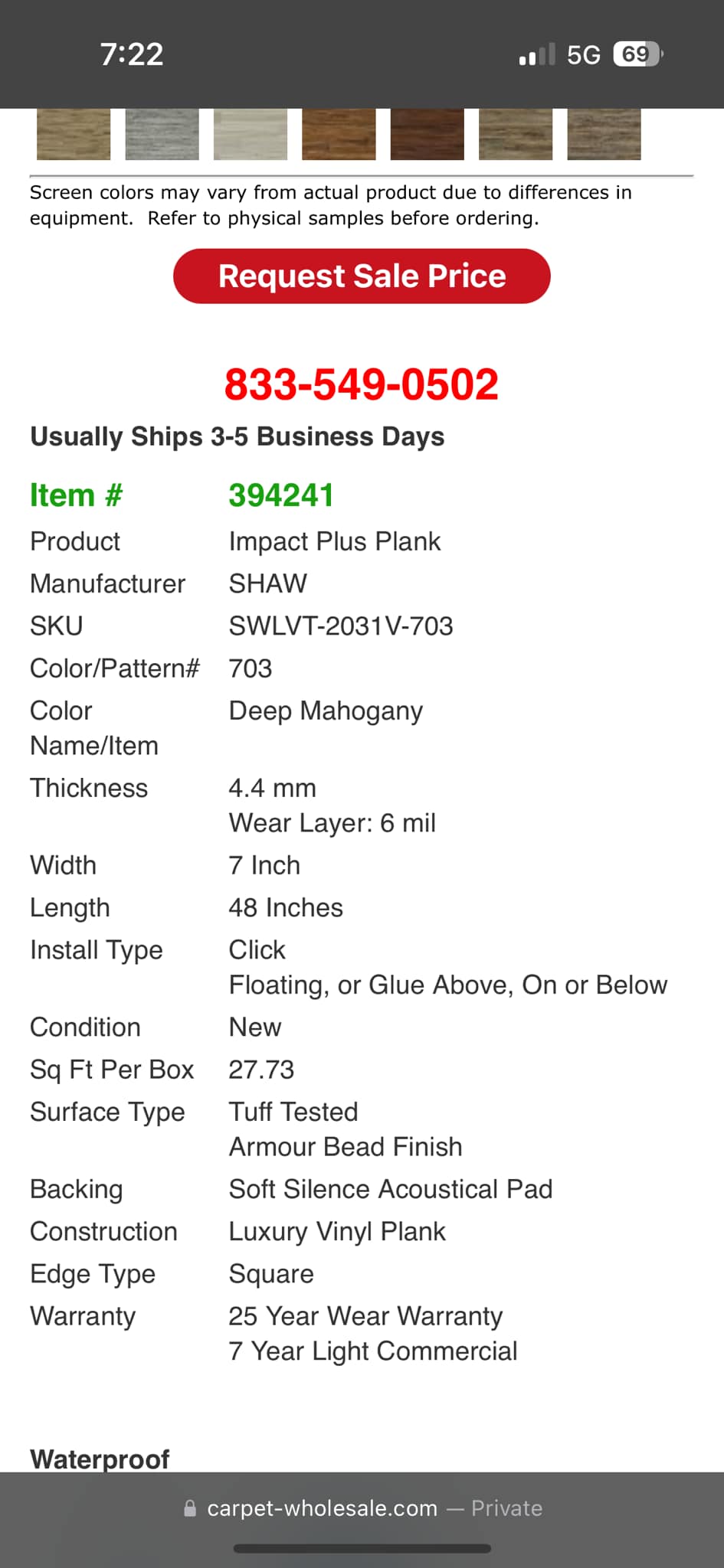Any advice on fixing or preventing worsening cracks in LVP flooring installed by a previous homeowner earlier this year?
8 months ago
Last Updated: October 23, 2024
I noticed some cracking in the LVP flooring that was put in by the previous homeowner’s company back in January. Any advice on fixing it or preventing it from getting worse?
It’s a bit hard to see, but there seems to be a slight difference in height from one side of the crack to the other.
I’ve also attached the floor specs for reference.


I’m not sure how to prevent it but a few of ours during installation appeared similar to this one without the crack, but it seemed to be affected when locking.
Did they make sure the floor was flat before they installed the new flooring? I’ve heard that uneven floors can cause issues with seams.
Duncan I don’t know about the work done before we bought the house. This specific area is the only one with this problem. There’s another spot with a similar issue in a hallway about 30 feet away.
The problem is likely due to poor floor preparation. Try using a level or something flat to assess the condition of the floor.
Instead of blaming floor preparation, it’s more likely a problem with the product quality. Unless you’re investing in high-priced LVP, this issue is bound to occur, regardless of the floor preparation.
I’m facing a similar issue, and the only solution seems to be taking it out for replacement, even though it’s not the most convenient or ideal option. Our floor has been in place for two years now and it’s completely ruined, with cracks everywhere. It’s quite disappointing, to be honest!
While putting it together, it ended up getting broken.
LVP is trash
Oh, seriously? What’s the story?
Those who opt for inexpensive LVP or fail to install it properly often share this feeling.
It’s just so good.
Our flooring has endured heavy foot traffic and the antics of two 80lb dogs running around on it nonstop. No issues whatsoever.
Sounds like you ended up with a high-quality product.
To be honest….it was the most affordable option available at Home Depot…..TrafficMaster for 0.99 per square foot. I understand that price doesn’t always reflect quality….but many of my friends and relatives have LVP and it has all remained in good condition.
There are a few factors that could contribute to this problem. Most likely, it’s due to using cheap materials that tend to behave this way, regardless of the installation process. Another possibility is applying too much force when locking the planks together. Lastly, the floor might be beyond the manufacturer’s deflection specifications. The only solution is to replace those planks; unfortunately, there’s no way to prevent other planks from experiencing the same issue.
That sounds like an issue with the installation process. It seems the planks were locked in and laid out flat on the long side, then tapped forward to meet the ends. The crack likely occurred when the two ends locked together. When installing this type of flooring, it’s crucial to ensure the ends are perfectly aligned so they come together smoothly when the plank is laid flat. It’s possible that most of the floor is affected in a similar way, but the crack only became visible in that particular spot.
The problem here seems to be with the installation, which is making a pre-existing defect worse. The tabs on the locking mechanism are breaking off. The manufacturer might claim it was installed incorrectly, but it’s worth checking. It seems like there was too much pressure during installation, either from mishandling the material or snapping it at the wrong angle.
Hey there! I’m a Realtor – Reach out to your agent and have them inquire with the listing agent about who the installer was. If it was a flooring contractor, they should be able to come back and fix it, especially if it’s within 12 months. If it was a DIY job, try contacting the manufacturer and discussing the issue with them.
Quick tip for future buyers – When work is done before selling (within 12 months), like floors, roofs, furnaces, etc., ask for copies of invoices or warranty information provided. It could save you in the long run!
I actually have copies of the installation paperwork. The previous homeowner mentioned it was under warranty, but there’s no paperwork to support that. The company that installed it claims the labor warranty doesn’t transfer. The manufacturer of the LVP also mentioned they won’t cover it under warranty since I’m not the original buyer.
I was thinking of contacting the contractors board to inquire, especially since the floor is less than a year old. You might get different information from them.
Hey, I tried googling but didn’t find much. The house is in Knoxville, TN. Do you know if there is a contractors board there? Could you help me with that?
I’ve heard that Servall offers installation warranties. Pretty neat, right?
Hey , have you thought about reaching out to the state contractor licensing board for advice?
I’ve had my fair share of experience laying down thousands of square feet of LVP, and I’ve only encountered this issue with low-quality products.
I included the product specifications in the photos. Does that meet your expectations for it being budget-friendly LVP?
I wasn’t expecting anything and I didn’t mean to sound rude. I’m sorry if it came across that way. Shaw is typically a decent product overall. The only other reason for the issue could be that the installer didn’t align it properly when securing the end. To fix it, you may need to cut out the old piece and replace it. I’m located in St. Genevieve, Missouri. If you’re nearby and have extra flooring, I’d be happy to help you out.
Low-quality flooring can lead to side effects like this. LVP isn’t very durable.
That piece broke right next to the joint. One of the most important tools you’ll need for the installation is a vacuum and a rubber mallet. It’s essential to remove the flooring and replace the broken pieces to fix it properly.
Any ideas, , on what might have caused the break? Incorrect installation technique, inadequate prep work, or a subpar product?
Most of the time, , there seems to be dust or debris in the lock joint during installation. Sometimes, installers forget to tap the top of all the flooring joints with a mallet, so it doesn’t fully lock. The flooring may have been damaged during shipping. Installing the flooring in the wrong direction can also cause unnecessary roughness and potential damage.